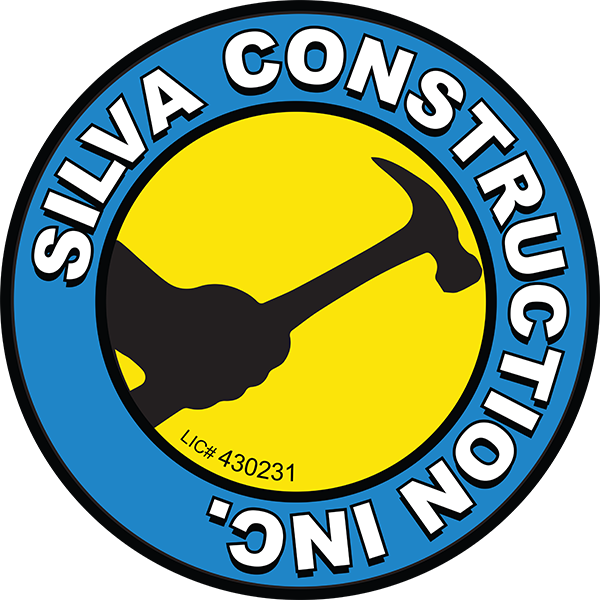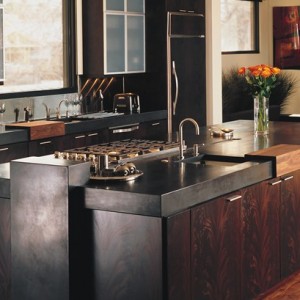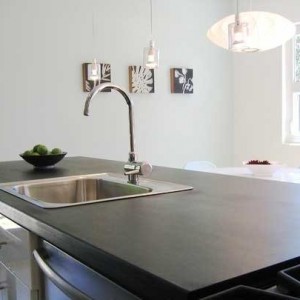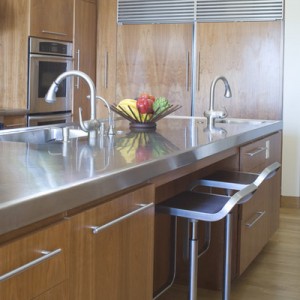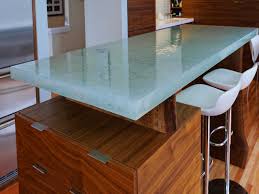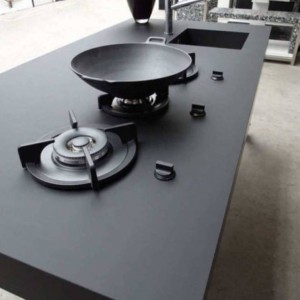Question: What type of material would you recommend for the kitchen countertop?
Answer: I usually dont answer this question instead I educate so the customer can make the choice depending on the qualities that best suit them. One would have to know whats available and the pro’s and con’s of each. After reading this they usually know what they want, which one fits their lifestyle and budget the best. I also suggest that they see and touch the stone before making a final decision.
There are quite a few materials to pick from so I will start with the more unique counter top materials now on the market. Some of this data is from the Houzz website and some from Five Star Stone and Cabinet Company in Clearwater Florida.
Concrete
Pros: First of all, concrete countertops can be absolutely beautiful. If you’re picturing laying a piece of sidewalk over your cabinets or work island, you’ve got the wrong mental image. Most homeowners choose pigmented or stained concrete counters that revolutionize their appearance. With pigment, you can have nearly any shade you desire. With staining, you can give your countertops the look of granite or other natural stone. Texturing techniques increase the uniqueness and beauty of the finished product.
Some skilled installers specialize in embedding tile, stone, glass, shells or other materials in the concrete to produce a work of art that is also highly functional and durable.
Concrete, as you know, is extremely hard and tough. It will stand up very well to the wear and tear of a busy kitchen or active family. It won’t scratch and is very heat resistant. These two qualities are essential in kitchens and bathroom where sharp objects and hot items are common.
Cons: Concrete countertop prices are high, so this will turn off many homeowners right from the start. When you get estimates, you’ll find prices ranging from $75-$150 per square foot, or possibly higher if you choose an elaborate design.
Secondly, concrete counters require a level of maintenance some won’t want to deal with or have the time for. They must be properly sealed from the beginning and then resealed every 1-3 years. When not sealed correctly, concrete is susceptible to staining, a weakness it shares with granite and marble. Wine, juice, coffee or oil are just a few things that can produce a stain, and all are common in the kitchen.
Cost: $75-$150 per square foot,
Butcher Block
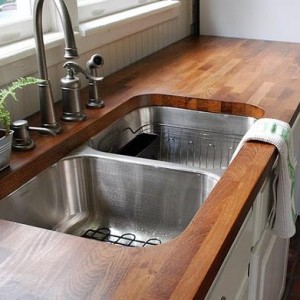
Butcher block has a classic appeal and always looks fresh. It’s especially fitting for traditional, country and cottage-style kitchens.
Pros: Many homeowners like butcher block’s warm, natural appearance and variegated wood tones. Although knives scratch it, many people like the shopworn look it develops — after all, it’s what chopping blocks have been made of for years. But you can also sand scratches down with ease.
Cons: Wood swells and contracts with moisture exposure, and butcher block is no exception. It harbors bacteria and needs frequent disinfecting. Oiling is a must to fill in scratches and protect the surface.
Cost: $35 to $70 per square foot, installed
Paper Composite
Paper countertops? You read it right. Created from paper fibers mixed with resin, this surface is ecofriendly and a whole lot more durable than it sounds.
Pros: Paper composite evokes the look of solid surfacing or laminate but with a warmer sensibility. It’s surprisingly hardy and can withstand heat and water admirably. It’s also a great deal lighter than natural stone or concrete.
Cons: The material isn’t scratchproof and is susceptible to chemical damage. It needs an occasional rubdown with mineral oil, and even sanding, to refresh it. Although it sounds as though it would be a lower-budget option, it isn’t (unless you install it yourself).
Cost: $85 to $125 per square foot, installed
Stainless Steel
Once found mostly in commercial kitchens,stainless steel has slipped into vogue within the past two decades. These countertops are custom made to fit your kitchen, so you’re guaranteed a tailored look.
Pros: There’s a reason stainless steel is used in restaurants and other high-traffic kitchens: It’s nearly indestructible, and it resists heat and bacteria. It also provides a very distinctive look that feels appropriate in contemporary and industrial-style kitchens.
Cons: Fingerprints show and must be wiped off frequently, and stainless steel can also dent. It can be loud as pots, pans and dishware clang against the surface. Chemicals can affect its color and cause unwanted etching. Stainless steel is extremely expensive due to the custom fabrication.
Cost: $65 to $125 per square foot, installed
Glass
The transparency of the glass adds depth to the surface. Like stone countertops solid glass comes in sheets. So there may be seams.
If the glass is embedded into concrete, sealing is required every six months.
Glass is a dramatic and unique surface. It’s like having a piece of art as your counter top.
Pros:
- Environmentally-friendly
- Visually appealing
- Easily cleaned
- Heat tolerant
- Non-porous (unless concrete is used)
- Customizable
Cons:
- Can be scratched, chipped or broken
- Shows fingerprints
- Shows water spots
- Vulnerable to acidic substances
Cost: $50-$100 per square foot
Nanotech Matte Material
The process of using nanotechnology has been around since the 1980’s, but it has only recently been used in building materials. Although it’s technically a thermo-laminate, nanotech matte material is in a class of its own.
It’s soft to the touch, 500 times stronger than regular laminate material, self-healing, anti-microbial and anti-fingerprint.
It comes in a variety of 14 decors – eight plain colors, three iridescents, two wood grains and one stone, all with a matte finish.
It’s ideal for a minimalist or modern style. Though, some of the muted colors and patterns would easily work with a traditional style as well.
Pros:
- Durable
- Anti-reflective
- Self-healing
- Scratch resistant
- Easily cleaned
- Resistant to acid solvents
- Smudge proof
- Heat resistant
- Water resistant
- Enhanced anti-bacterial properties
- Long lifespan (environmentally friendly and saves money)
Cons:
- Limited color options
- Only available in matte finish
Cost: per square foot $65 – $100
Next week: Natural and Engineered Stone counter tops.
Dave Silva/GC
